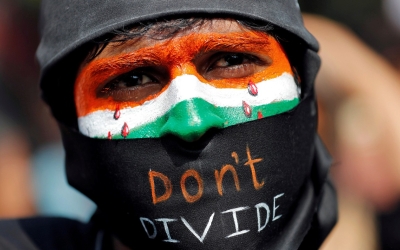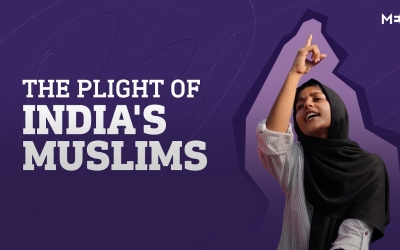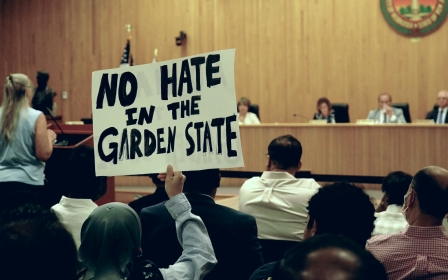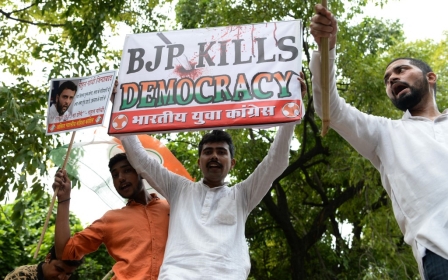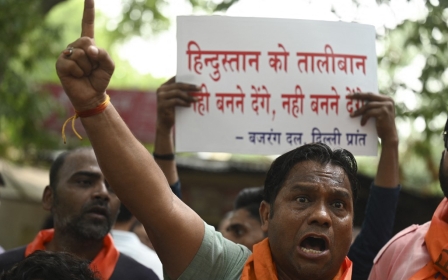US appoints leader of Hindu nationalist group to interfaith council
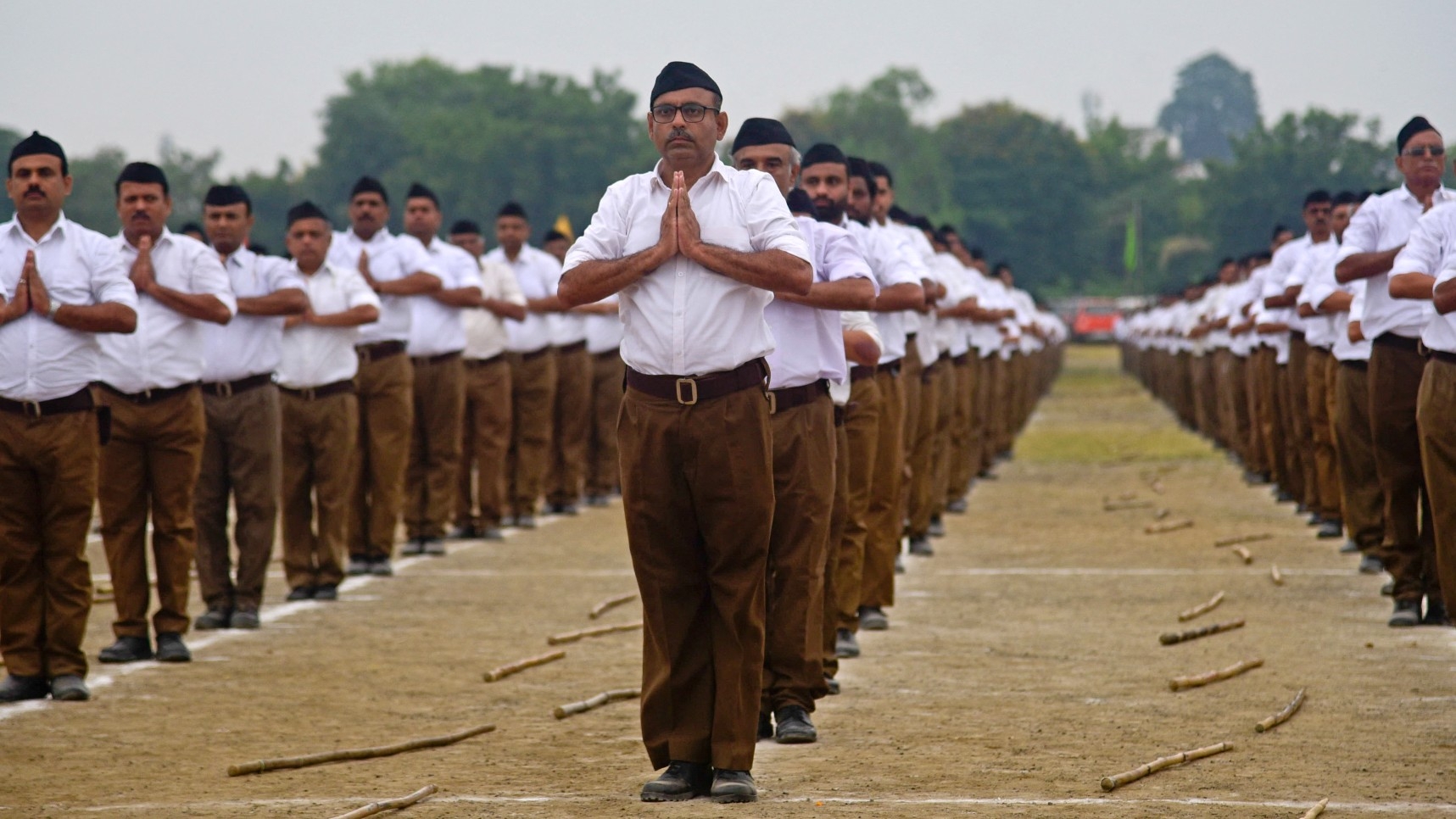
A Hindu-American community leader appointed to the Department of Homeland Security's (DHS) faith-based religious council is a senior member of an organisation associated with a Hindu supremacist group in India, Middle East Eye can reveal.
Chandru Acharya, who was appointed by the DHS in late September to advise the US government on domestic issues, is a director of the Hindu Swayamsevak Sangh (HSS-USA), a group that has repeatedly defended the policies of India's right-wing Prime Minister Narendra Modi.
The HSS says it is apolitical and says it acts as a vessel for celebrating Hindu cultural and religious values.
Acharya confirmed his association with HSS-USA to Middle East Eye but denied any affiliation between his organisation and the RSS.
The organisation is made up of hundreds of branches in close to 40 countries.
New MEE newsletter: Jerusalem Dispatch
Sign up to get the latest insights and analysis on Israel-Palestine, alongside Turkey Unpacked and other MEE newsletters
The 25-member faith-based security council on the DHS, which includes leaders from several faiths, was set up to provide advice to the secretary on matters "related to protecting houses of worship, preparedness and enhanced coordination with the faith community".
MEE contacted the DHS for comment but did not receive a response by time of publication.
Ria Chakrabarty, policy director for Hindus for Human Rights (HFHR), told MEE: "The RSS is the ultra-right wing Hindu extremist organisation and the founding of the Hindutva ideology, which is a Hindu supremacist and Islamophobic ideology.
"The HSS is the overseas arm of the RSS. We firmly oppose the inclusion of organisations like HSS in any religious freedom council."
'Regrettably, DHS has chosen an individual representing a supremacist hate group'
- Rasheed Ahmed, Indian American Muslim Council
Scholars and activists describe the RSS, formed in 1925 in Nagpur, India, as the backbone of Hindutva or the Hindu nationalist movement in India. Its aim is to make India a Hindu Rashtra or Hindu state.
It is under the RSS that the ruling Bharatiya Janata Party (BJP), as well as several other organisations like the HSS and the right-wing religious organisation Vishva Hindu Parishad, emerged in hundreds of branches across dozens of countries over the past four to five decades.
The organisations operate separately on an administrative level but ultimately fall under the umbrella of the RSS. Modi is a lifelong RSS member.
Several sources, however, including the official HSS website, either state they have been inspired by the RSS or credit the RSS as its parent organisation.
The HSS and its connected organisations in the diaspora, scholars say, are primarily tasked with amplifying and defending the project of Hindu nationalism or Hindutva outside India.
Several Indian Americans, including activists and scholars of South Asia, told MEE that it was "very troubling" that a member of a known group linked with and inspired by a supremacist organisation that sees India's minorities as second-class citizens would now make their way into a body purportedly looking to shape the domestic policies of the US government.
Rasheed Ahmed, executive director of the Indian American Muslim Council, told MEE: "How can a member of a group whose parent organisation in India is implicated in violence against religious minorities and attacks their places of worship be a good fit for this position?
"Regrettably, DHS has chosen an individual representing a supremacist hate group," Ahmad added.
Defending Modi
MEE has also found that Acharya, a Michigan-based IT consultant, has used his position as a Hindu community leader to discredit efforts to raise awareness of rising religious intolerance in India.
In April, Acharya was among a group of Hindu-Americans who questioned the veracity of a United States Commission on International Religious Freedom (USCIRF) report that designated India as a "country of particular concern" over what they found to be diminishing rights for Muslims and Christians in the country.
"The [Indian] government continued to systemise its ideological vision of a Hindu state at both the national and state levels through the use of both existing and new laws and structural changes hostile to the country's religious minorities," the USCIRF said.
The USCIRF recommended that the US impose targeted sanctions on individuals or groups responsible for violating religious freedoms.
Acharya was quoted in The Print describing the findings as "one-sided" and "biased".
"The report provides a one-sided and biased narrative about religious freedom in India with exaggerated claims that are designed to fuel an ecosystem of fear and hate. The report lacks authenticity and attempts to brand the vast majority of peace-loving and pluralistic Hindus as extremists," Acharya said.
Acharya told MEE this month that he stood by his criticism of the report, citing a 2021 Pew Research survey. But India's Article 14 - a website that is a joint effort by lawyers, academics and journalists to provide "intensive research and reportage, data and varied perspectives" - described the Pew Research study as "the latest to lay bare the schisms in Indian society".
A year earlier, in April 2020, as the first wave of the Covid-19 virus swept the world, several BJP leaders directly blamed Muslims for the spread of the virus, even going so far as to claim that Muslims were deliberately spreading the virus.
Human Rights Watch wrote that the BJP used terms like "Talibani crime" and "CoronaTerrorism" to insinuate that Muslims were deliberately spreading the virus, adding that some mainstream media resorted to "CoronaJihad", resulting in the hashtag going viral on social media.
Academics Shakuntala Banaji and Ram Bhat wrote that the coronavirus had simply "added a new dimension to the hate speech and disinformation circulated about Muslim communities in India".
"The BJP, RSS and Sangh Parivar [a collection of Hindu nationalist organisations] campaign of producing hate and inciting violence against Muslims in India runs as a well-oiled machine that has internal complexity and leaves the ruling party with plenty of scope for plausible deniability when their supporters resort to murder," the duo wrote on a blog in September 2020 published by the London School of Economics.
But in September 2020 when Acharya, in his capacity as president of South Asian American Voices for Impact, wrote to the Dalit civil rights organisation Equality Labs, and questioned their campaign to draw attention to right-wing attempts to scapegoat Muslims for the spread of the coronavirus in India.
Acharya rejected Equality Labs' online campaign to highlight how disinformation had fuelled Islamophobia during the pandemic, and wrote that "it is ugly out there and it is not uniquely Islamophobic or Hindu nationalist".
"Unfortunately although I dislike these trolls and their harassment, it is the price that we pay in a democracy to protect free speech. With hostilities between India and Pakistan in play, it is very clear that both sides are using the online space to make their case and make the other look like an unsafe place for minorities."
"We do not feel that your organisation represents the interests of all South Asians with integrity or honesty," Acharya said.
'Growing schisms in Indian society'
Mobashra Tazamal, a DC-based researcher working on Islamophobia, told MEE that if Acharya refused to accept the findings of the USCIRF report, then it is unclear how he could be trusted to carry out his mandate to protect all faith communities.
"I believe there is a very clear conflict of interest here, and given Acharya's comments and affiliations, his role in the council would severely impact the impartial nature of the organisation," Tazamal said.
Chakrabarty from HFHR said Acharya's comments wouldn't alter the facts about the diminishing space for religious minorities in India. He said questions had to be asked about the DHS itself hosting a faith-based council, given the harm it has brought to so many faith communities in the US.
'I trust my selection was done by the administration based on my body of work and my contributions to the community'
- Chandru Acharya
"We also have reservations with DHS forming a religious freedom council, given DHS policies and practices that have been harmful and discriminatory towards Muslims and Sikhs, among others.
"DHS was in charge of enforcing President Trump’s Muslim travel ban, has a history of spying on mosques, and just this year, seized the turbans of Sikh asylum seekers at the US-Mexico border," Chakrabarty said.
Speaking to MEE, Acharya insisted he could be a fair and honest participant despite his views and affiliations.
"I trust my selection was done by the administration based on my body of work and my contributions to the community.
"As the only Hindu in the 25-member council, I wish to represent the Hindu-American community and play a positive role in keeping all faith houses in the United States, including Temples, Mosques Gurudwaras, Churches and Synagogues, safe," Acharya added.
He also cited a decade-long record of working with local government, interfaith groups and community organisations, like the Michigan Asian Pacific American Affairs Commission, the Plymouth Canton Interfaith Outreach, and the India League of America, as proof of his commitment to "interfaith dialogue, social equity and civil rights" over the past decade.
"I personally believe that every human should have freedom of faith and they should be treated as equal," Acharya said.
In his interview with MEE, Acharya would not say if he considered the RSS a supremacist organisation. Instead, he said that it was those members who had strayed from Hinduism who were supremacist.
"If members of RSS abandon the core philosophy of Hinduism and think they are superior to others, they are supremacist," Acharya said.
Tazamal, the DC-based researcher working on Islamophobia, told MEE that while the HSS may be now trying to disassociate itself from the RSS, there were still some notable and troubling connections.
She cited two recent events co-sponsored by the HSS (USA) and the HSS (UK) featuring Dattareya Hosable, the general secretary of the RSS.
"The UK branch of HSS promoted the event featuring Hosable under the title 'RSS: A Vision in Action'. If the HSS is not connected to RSS, then why feature the leader of the group as a keynote speaker?"
"Do these sponsorships and features of the RSS not serve as endorsements of the group? While Acharya may claim that there are no connections, these two events clearly indicate that links still exist," Tazamal added.
In recent months, Indian-American activists have been alarmed at what they say is a deepening of Hindu nationalist rhetoric and activities in the United States.
In August, Indian leaders in the town of Edison, New Jersey, brought a bulldozer, widely seen as an anti-Muslim symbol in India, to the annual Indian Independence Day parade in the township.
Organisers were forced to apologise following outrage from the community.
Likewise, Chakrabarty, of the HFHR, pointed to several other events in which RSS leaders were either celebrated or platformed.
"Acharya had his reasons for denying those connections, but I think the facts speak for themselves," she added. "At root is our commitment to India as a secular democracy, whereas the HSS and RSS want India to become a Hindu Rashtra [nation]," she added.
Middle East Eye delivers independent and unrivalled coverage and analysis of the Middle East, North Africa and beyond. To learn more about republishing this content and the associated fees, please fill out this form. More about MEE can be found here.


